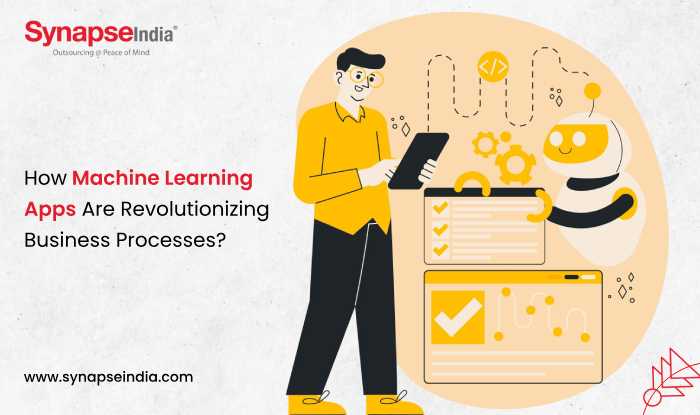 01 May 2025
01 May 2025
Did you know that the global machine learning market is projected to hit $105.45 billion in 2025? This explosive growth, reported by Statista, underscores how machine learning is reshaping business operations worldwide.
From automating mundane tasks to delivering personalized customer experiences, machine learning applications are driving efficiency and innovation across industries.
We at SynapseIndia build machine learning apps that solve real problems and improve business efficiency.
In this blog, we’ll explore how machine learning apps are changing the way businesses operate, the challenges they face, and what the future holds in 2025.
This blog is to justify how machine learning apps changes the way businesses operate, the faced challenges

Machine learning, a subset of artificial intelligence, involves algorithms that learn from data to perform tasks without being explicitly programmed. It’s like teaching a computer to recognize patterns and make decisions based on experience. There are three primary types of machine learning:
In business, machine learning powers applications like predictive analytics, fraud detection, and personalized marketing.
Machine learning app development enables companies to create tailored solutions that address specific operational needs, from optimizing supply chains to enhancing customer support.
Machine learning is versatile, with applications spanning multiple sectors. For instance, retailers use it to predict inventory needs, while healthcare providers analyze patient data to improve diagnoses. Machine learning app developers are crafting solutions that integrate smoothly into existing systems, making these technologies accessible to businesses of all sizes.
One of the most significant impacts of machine learning is its ability to automate routine tasks, freeing up human resources for more strategic work. This automation leads to increased efficiency and reduced operational costs.
Machine learning apps excel at handling repetitive tasks. In customer service, chatbots powered by machine learning, like Zendesk’s Answer Bot, respond to common inquiries by analyzing customer queries and suggesting relevant help articles. Similarly, companies like Apple use machine learning for automated troubleshooting, resolving issues faster, and improving customer satisfaction.
In supply chain management, machine learning optimizes logistics by predicting demand and streamlining operations. For example, UPS employs machine learning to forecast package volumes, enabling efficient resource allocation and reducing delivery delays. Machine learning app development services are creating tools that analyze real-time data, such as weather or traffic conditions, to optimize delivery routes, as noted in N-IX.
By automating tasks and optimizing processes, machine learning reduces costs. For instance, predictive maintenance in manufacturing uses machine learning to monitor equipment health, preventing costly downtime. A study by McKinsey suggests that predictive maintenance can reduce maintenance costs by up to 30%.
Machine learning empowers businesses to make informed decisions by analyzing vast amounts of data and providing actionable insights.
Predictive analytics uses machine learning to forecast future trends based on historical data. Retailers, for example, predict customer demand to optimize inventory, reducing stockouts and overstocking. According to Qlik, predictive analytics can improve efficiency by identifying opportunities and mitigating risks.
Machine learning enhances business intelligence tools, providing real-time insights for strategic planning. Financial institutions use these tools for credit scoring, predicting loan default risks based on customer data. This capability allows businesses to respond swiftly to market changes.
Machine learning enables real-time decision-making. For instance, marketing teams use machine learning to analyze campaign performance and adjust strategies on the fly, ensuring maximum impact.
Personalization is a cornerstone of modern customer experience, and machine learning is at its heart.
Machine learning segments customers based on behavior and preferences, enabling targeted marketing. Retailers use clustering algorithms to group customers with similar buying patterns, tailoring promotions to specific segments.
Recommendation systems powered by machine learning drive engagement and sales. Netflix analyzes viewing history to suggest content, keeping users engaged, while Amazon recommends products based on browsing and purchase history, boosting conversions.
Machine learning-powered chatbots enhance customer support by providing personalized responses. Bank of America’s Erica assists customers with financial management, reducing wait times and improving satisfaction.
Machine learning strengthens risk management and fraud detection by identifying anomalies and patterns in data.
Financial institutions use machine learning for real-time transaction monitoring. Algorithms like XGBoost detect suspicious activities in mobile payments, as demonstrated in studies on credit card fraud.
In insurance, machine learning identifies false claims by analyzing patterns in medical reports. This capability saves millions by preventing fraudulent payouts.
Cybersecurity firms use machine learning to detect unusual network behavior, protecting against threats. According to Cybercrime Magazine, global cybercrime costs are expected to reach $9.5 trillion annually by 2024, highlighting the importance of machine learning in fraud prevention.
Machine learning fuels innovation, giving businesses a competitive edge.
Companies like Tesla use machine learning in their Autopilot system, enhancing vehicle safety and performance. Similarly, Starbucks leverages machine learning for personalized offers, increasing customer loyalty.
In pharmaceuticals, machine learning accelerates drug discovery by predicting compound efficacy. Yseo uses machine learning to generate clinical documentation, saving thousands of hours annually.
While machine learning offers immense benefits, several challenges must be addressed.
Machine learning models require vast datasets, raising concerns about data privacy. Compliance with regulations like GDPR is essential to protect customer information.
Biased data can lead to unfair outcomes, such as discriminatory hiring practices. Ensuring algorithmic fairness is critical, as highlighted by Netguru.
The demand for machine learning professionals is growing, with a 75% increase in AI and machine learning jobs over the past four years (GeeksforGeeks). Businesses may need to partner with machine learning app developers to bridge this gap.
Integrating machine learning with existing systems can be complex and costly. Vates notes that legacy systems often require redesign to accommodate machine learning models.
As we look to 2025, machine learning is set to drive further transformation.
Generative AI, like Stable Diffusion for text-to-image synthesis, is expanding into multimedia content creation, offering new opportunities for marketing and design .
Machine learning is poised to disrupt industries like healthcare, with personalized medicine, and finance, with automated trading systems. The convergence of IoT and machine learning will create smarter, more efficient systems.
At SynapseIndia, we specialize in building machine learning applications that help businesses streamline operations and enhance customer experiences. Our team develops custom solutions that use machine learning algorithms to automate tasks, optimize processes, and improve decision-making.
For instance, we create predictive analytics tools to help businesses forecast trends and make data-driven decisions. We also design recommendation systems to personalize customer interactions and boost engagement.
Our machine learning apps enable businesses to enhance operational efficiency by automating repetitive tasks and reducing costs. We focus on creating tailored solutions that address unique business challenges, from customer support automation to fraud detection and risk management.
With our expertise, companies can unlock machine learning's potential to improve productivity and stay ahead in a competitive market. Whether you need tools for inventory management, customer segmentation, or process optimization, SynapseIndia is here to provide them.

Machine learning apps are transforming business processes by automating tasks, enhancing decision-making, and driving innovation.
From personalized customer experiences to robust fraud detection, the impact of machine learning is undeniable. However, businesses must navigate challenges like data privacy and skill shortages to fully realize these benefits.
As we move into 2025, trends like generative AI and AutoML promise to further reshape industries.
To stay competitive, businesses should partner with experts in machine learning app development.
Connect with SynapseIndia today to explore how machine learning can transform your operations and drive growth.

 23 Jan 2015
23 Jan 2015
